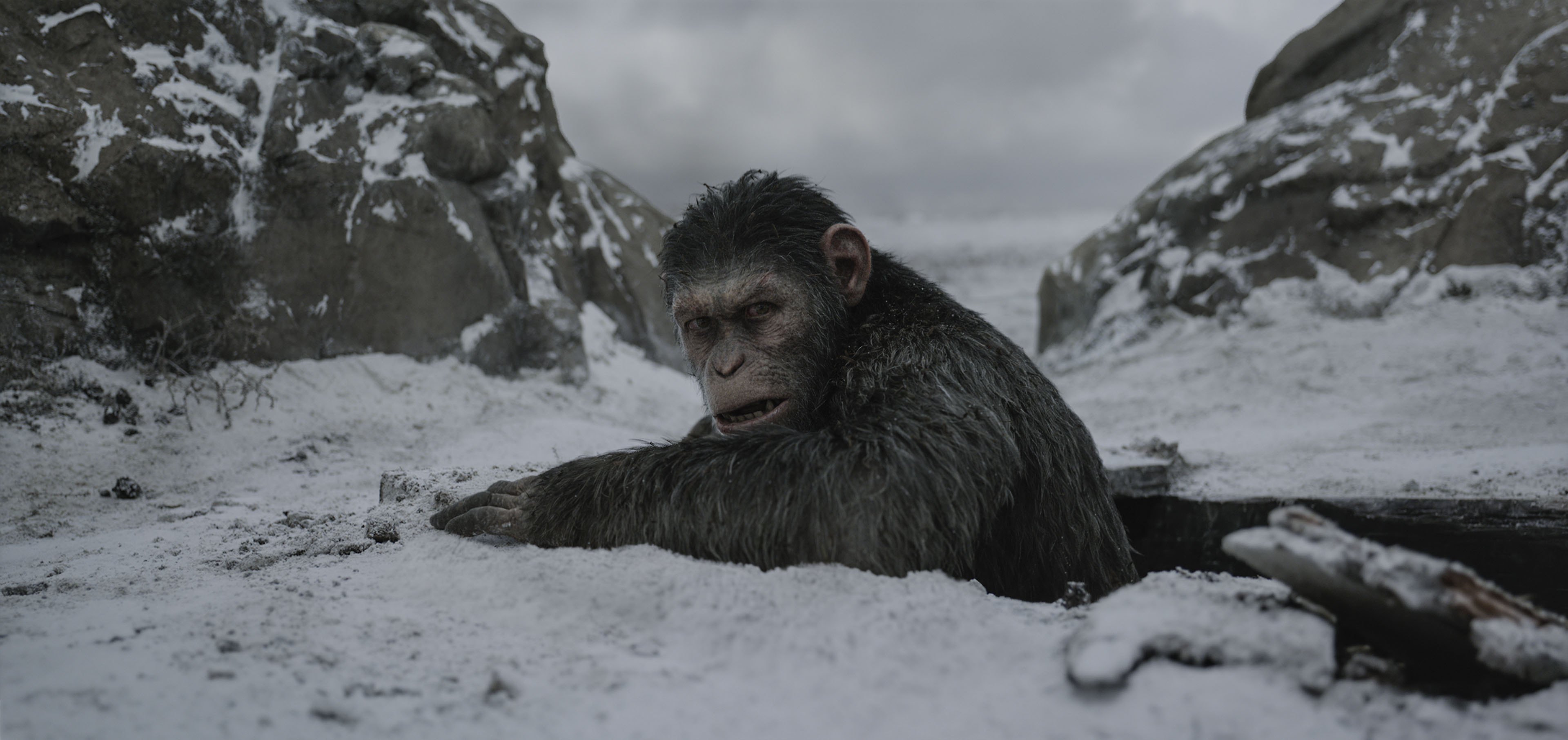The domestication of War for the Planet of the Apes
What was lost when the Planet of the Apes series got good


A free daily email with the biggest news stories of the day – and the best features from TheWeek.com
You are now subscribed
Your newsletter sign-up was successful
The original Planet of the Apes series was a franchise before the Age of Franchises. During its five-year run, a new film appeared almost annually from 1968 through 1973, and, as was typical in their time period, the sequels became progressively cheaper and hastier to produce. By contrast, the new Apes series, which comes to a conclusion this week with War for the Planet of the Apes, is a statelier affair: The special effects that bring the ape characters to life get even more detailed, convincing, and gorgeous; the ongoing story deepens and expands; and the reviews get better and better.
Yet this new Apes trilogy very much takes its cues from two of the cheaper and less well-regarded earlier entries: 1972's Conquest of the Planet of the Apes (part four), and 1973's Battle for the Planet of the Apes (part five). It's a canny mining of the series' past that avoids remaking the classic 1968 original. Tim Burton did a kinda-sorta remake back in 2001 that made a lot of money and frustrated a lot of moviegoers, sending the series into a 10-year stasis before Fox started over with Rise of the Planet of the Apes in 2011. The new movies resemble prequels, but they aren't intended to lead into the 1968 film. They're more like prequels building toward a remake that hasn't yet been made (and hopefully doesn't need to be).
War for the Planet of the Apes picks up a couple of years after Dawn of the Planet of the Apes, which was set only about a decade after the basically contemporary Rise. Humankind, decimated by a simian flu that has sent apes forward in their evolution, has been mounting offenses against their ape rivals, led by Caesar (played, as before, by Andy Serkis in a motion-capture suit augmented by the work of insanely talented computer animators). The leader of the human resistance is known only as the Colonel (Woody Harrelson), and a devastating early attack leaves Caesar hungry for revenge.
The Week
Escape your echo chamber. Get the facts behind the news, plus analysis from multiple perspectives.

Sign up for The Week's Free Newsletters
From our morning news briefing to a weekly Good News Newsletter, get the best of The Week delivered directly to your inbox.
From our morning news briefing to a weekly Good News Newsletter, get the best of The Week delivered directly to your inbox.
The new Apes movies aren't as twisty as their ancestors, so War's trajectory isn't especially complicated. Caesar, haunted by the memory of the similarly vengeful Koba, saddles up to seek out and kill the Colonel. A few of his trusted associates insist on accompanying him, forming a sort of ape posse. On their way to the Colonel's camp, they encounter a slightly addled chimp called Bad Ape (Steve Zahn), who can also talk (Caesar speaks, but most of the others communicate in sign language) — and a young girl (Amiah Miller), who cannot.
The Colonel and the young girl are the only two human characters of any consequence, and it's a bold, smart decision from director/co-writer Matt Reeves. His Dawn spent too much time balancing out its ape story with less interesting humans, while War's ape-centric point of view echoes Conquest and Battle, which followed Caesar's development as a revolutionary.
A shift to even heavier ape action is enabled by some truly stunning — and painterly — visual effects. So many CGI representations of living things scurry and wriggle across the screen in constant motion. The Apes team recognizes the power of stillness, allowing Reeves to go in close on Caesar. A human equivalent spending this much of the movie glowering might well become insufferable, but there's nuance to the animation of Caesar's eyes and face that, at times, seems to reach beyond typical live-action performance without affixing too many effects-y curlicues. Even Zahn's more manic Bad Ape, who dresses in people clothes and provides much-needed comic relief, has weight and texture.
As a production, then, War for the Planet of the Apes is superior to a lot of the old movies. Taken together, the new Apes trilogy tells a more detailed version of the Conquest/Battle story — how apes were forced to rise up against their oppressors. In the older films, the apes had been enslaved by humans, and the uprising sparked in Conquest led to nuclear war, the aftermath of which is seen in Battle, where ape infighting threatens peace between the species. The trilogy deploys many of these elements (the human army enslaves captured apes in War, for example) with a measured thoughtfulness that sets it apart from most of its summer-blockbuster competition.
A free daily email with the biggest news stories of the day – and the best features from TheWeek.com
If there's a limiting factor to the new Apes movies, which are generally terrific, it's that their pacing as a series feels a touch methodical, their imagination bound up with respectability. Movie by movie, they're very entertaining, and despite its title, War touches on other genres: There's an element of westerns to the way a grizzled Caesar saddles up to confront his enemy, and the prison-break stylings of Rise are revisited in the back half of the film. It's a more eclectic and, even with all its seriousness, more fun movie than Dawn.
But there's nothing like the tonal and subject whiplash of the earlier series, which featured nuclear annihilation, time-travel, fish-out-of-water comedy, and riffs on both religion and race relations before even getting to the events of Conquest. In the context of its predecessors, that movie's revolutionary climax feels raw and even dangerous in a way that none of the current Apes movies quite touch. Part of its power derives from the earlier series' willingness, even or especially in its waning years, to both touch upon hot-button politics and to paint itself into a series of narrative corners (this is a five-movie series where the second installment ends with the nuclear destruction of Earth).
Many will refer to the new Apes trilogy as "political," and it is, in its way. The Colonel's rage at the idea of being outmoded — and his insistence that his troopers must build a wall! — will bring to mind the fearmongering and prejudice of today's White House. But War is more likely to reference Apocalypse Now (repeatedly) than real-life events that inspired movies like Apocalypse Now; the storytelling is both more grounded and more indebted to past films, Apes and otherwise.
This shouldn't take away from War for the Planet of the Apes being one of the best movies of the summer. Reeves wrings more tension from apes surreptitiously signing at each other in a prison camp than most big movies get from major visual effects smackdowns. But if the series continues, I hope it goes on some stranger, riskier tangents.
More Apes movies aren't really necessary, and that's exactly why I want to see some crazy human try to justify their efforts.
Jesse Hassenger's film and culture criticism has appeared in The Onion's A.V. Club, Brooklyn Magazine, and Men's Journal online, among others. He lives in Brooklyn, where he also writes fiction, edits textbooks, and helps run SportsAlcohol.com, a pop culture blog and podcast.
-
 The ‘ravenous’ demand for Cornish minerals
The ‘ravenous’ demand for Cornish mineralsUnder the Radar Growing need for critical minerals to power tech has intensified ‘appetite’ for lithium, which could be a ‘huge boon’ for local economy
-
 Why are election experts taking Trump’s midterm threats seriously?
Why are election experts taking Trump’s midterm threats seriously?IN THE SPOTLIGHT As the president muses about polling place deployments and a centralized electoral system aimed at one-party control, lawmakers are taking this administration at its word
-
 ‘Restaurateurs have become millionaires’
‘Restaurateurs have become millionaires’Instant Opinion Opinion, comment and editorials of the day
-
 Walter Isaacson's 'Elon Musk' can 'scarcely contain its subject'
Walter Isaacson's 'Elon Musk' can 'scarcely contain its subject'The latest biography on the elusive tech mogul is causing a stir among critics
-
 Welcome to the new TheWeek.com!
Welcome to the new TheWeek.com!The Explainer Please allow us to reintroduce ourselves
-
 The Oscars finale was a heartless disaster
The Oscars finale was a heartless disasterThe Explainer A calculated attempt at emotional manipulation goes very wrong
-
 Most awkward awards show ever?
Most awkward awards show ever?The Explainer The best, worst, and most shocking moments from a chaotic Golden Globes
-
 The possible silver lining to the Warner Bros. deal
The possible silver lining to the Warner Bros. dealThe Explainer Could what's terrible for theaters be good for creators?
-
 Jeffrey Wright is the new 'narrator voice'
Jeffrey Wright is the new 'narrator voice'The Explainer Move over, Sam Elliott and Morgan Freeman
-
 This week's literary events are the biggest award shows of 2020
This week's literary events are the biggest award shows of 2020feature So long, Oscar. Hello, Booker.
-
 What She Dies Tomorrow can teach us about our unshakable obsession with mortality
What She Dies Tomorrow can teach us about our unshakable obsession with mortalityThe Explainer This film isn't about the pandemic. But it can help viewers confront their fears about death.
